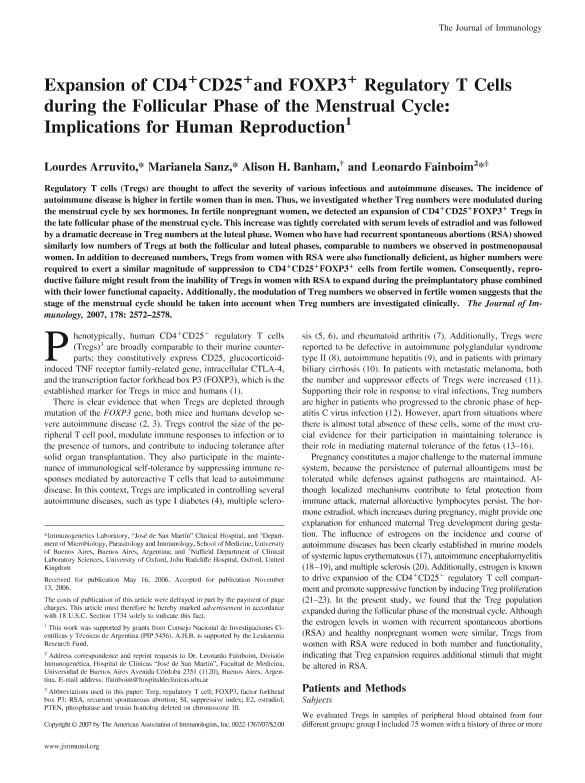Artículo
Expansion of CD4+CD25+and FOXP3+ regulatory T cells during the follicular phase of the menstrual cycle: implications in human reproduction
Fecha de publicación:
02/2007
Editorial:
American Association of Immunologists
Revista:
Journal of Immunology
ISSN:
0022-1767
Idioma:
Inglés
Tipo de recurso:
Artículo publicado
Clasificación temática:
Resumen
Regulatory T cells (Tregs) are thought to affect the severity of various infectious and autoimmune diseases. The incidence of autoimmune disease is higher in fertile women than in men. Thus, we investigated whether Treg numbers were modulated during the menstrual cycle by sex hormones. In fertile nonpregnant women, we detected an expansion of CD4 CD25 FOXP3 Tregs in the late follicular phase of the menstrual cycle. This increase was tightly correlated with serum levels of estradiol and was followed by a dramatic decrease in Treg numbers at the luteal phase. Women who have had recurrent spontaneous abortions (RSA) showed similarly low numbers of Tregs at both the follicular and luteal phases, comparable to numbers we observed in postmenopausal women. In addition to decreased numbers, Tregs from women with RSA were also functionally deficient, as higher numbers were required to exert a similar magnitude of suppression to CD4 CD25 FOXP3 cells from fertile women. Consequently, reproductive failure might result from the inability of Tregs in women with RSA to expand during the preimplantatory phase combined with their lower functional capacity. Additionally, the modulation of Treg numbers we observed in fertile women suggests that the stage of the menstrual cycle should be taken into account when Treg numbers are investigated clinically. The Journal of Immunology, 2007, 178: 2572–2578.
Palabras clave:
FOXP3
,
REGULATORY T CELLS
Archivos asociados
Licencia
Identificadores
Colecciones
Articulos(INIGEM)
Articulos de INSTITUTO DE INMUNOLOGIA, GENETICA Y METABOLISMO
Articulos de INSTITUTO DE INMUNOLOGIA, GENETICA Y METABOLISMO
Articulos(SEDE CENTRAL)
Articulos de SEDE CENTRAL
Articulos de SEDE CENTRAL
Citación
Arruvito, Maria Lourdes; Sanz, Marianela; Banham, Alison H.; Fainboim, Leonardo; Expansion of CD4+CD25+and FOXP3+ regulatory T cells during the follicular phase of the menstrual cycle: implications in human reproduction; American Association of Immunologists; Journal of Immunology; 178; 4; 2-2007; 2572-2578
Compartir
Altmétricas




